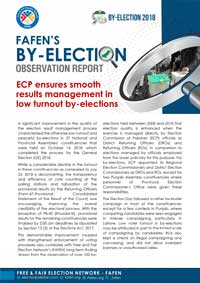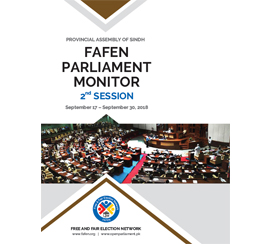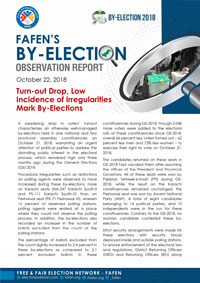ISLAMABAD, October 16, 2018: Free and Fair Election Network (FAFEN) observed significant improvement in the quality of the election result management process during low-turnout October 14 by-elections, which remained peaceful throughout the day, says a press statement released on Tuesday.
While a considerable decline in the turnout in these constituencies as compared to July 25, 2018 is disconcerting, the transparency and efficiency of vote counting at the polling stations and tabulation of the provisional results by the Returning Officers (Form-47-Provisional Consolidated Statement of the Result of the Count) was encouraging, improving the overall credibility of the electoral process. With the exception of PB-40 (Khuzdar-III), provisional results for the remaining constituencies were finalized by 2:00 am deadlines as stipulated by Section 13 (3) of the Elections Act, 2017.
This demonstrable improvement coupled with strengthened enforcement of voting processes also correlates with Free and Fair Election Network’s (FAFEN) long-term finding drawn from the observation of over 100 by-elections held between 2008 and 2018 that election quality is enhanced when the exercise is managed directly by Election Commission of Pakistan (ECP) officials as District Returning Officers (DROs) and Returning Officers (ROs), in comparison to elections managed by officials employed from the lower judiciary for this purpose. For by-elections, ECP appointed its Regional Election Commissioners and District Election Commissioners as DROs and ROs, except for two Punjab Assembly constituencies where personnel of Provincial Election Commissioner’s Office were given these responsibilities.
FAFEN deployed 1,737 Election-Day observers- 1,296 men and 441 women- who observed the voting and counting processes at 4,038 polling stations in 11 National Assembly and 27 Provincial Assembly constituencies (13 in Punjab, nine in Khyber Pakhtunkhwa, two each in Balochistan and Sindh). Elections in PP-296 (Rajanpur-IV) and PP- 87 (Mianwali-III) were uncontested, however, polling took place in the remaining 35 constituencies.
Nearly 54 percent less women and 44 percent less men turned out to poll their vote for National Assembly constituencies during the by-elections in comparison with the 2018 General Election (GE). However, Women’s turnout remained above the legal threshold of 10 percent in all the constituencies. While the turnout for NA constituencies declined from 51.9 percent to 26.5 percent, for Punjab PA constituencies from 57.8 percent to 43.7 percent, for Khyber Pakhtunkhwa PA constituencies from 45.4 percent to 21.7 percent and for Sindh PA constituencies from 50.9 percent to 36.8 percent.
A total of 374 candidates ran for 35 constituencies. Of these 139 candidates represented 27 political parties, while the remaining 235 contested these elections independently.
The Election Commission of Pakistan (ECP) had set up 7,489 polling stations comprising 21,783 polling booths for 9,283,074 registered voters in the 35 constituencies averaging 1,239 voters per polling station and 426 voters per booth.
These by-elections witnessed an increased number of registered voters on the electoral rolls — 42,810 voters (18,540 men and 24,270 women) — in comparison with July 2018.
Nearly one percent FAFEN observers were restricted from observing voting process and around six percent from the counting process. FAFEN observers reported a relatively lesser number of illegalities and irregularities during the voting process observed at 3,994 polling stations where they were allowed observation.
The right of voters to secrecy of the ballot was breached at 146 polling stations where the polling staff did not stop unauthorized persons from accompanying them behind secrecy screens. At 848 polling booths, secrecy screens were setup in a way that voters could be seen marking their ballots.
As many as 95 percent of the Presiding Officers interviewed by FAFEN observers said they were trained by ECP and had the required understanding of using the Results Transmission System (RTS). As many as 95 percent of Presiding Officers interviewed were able to successfully transmit the results through RTS. FAFEN observers reported a total of 27 incidents of violence albeit minor inside and outside polling stations.
For Urdu Press Release, click here | For the complete report, click here




